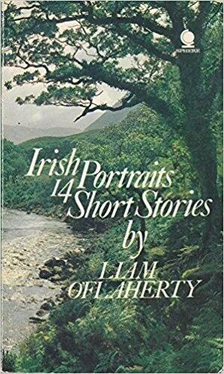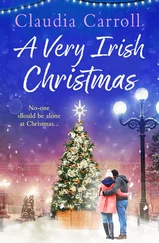“Where is little Charley going to sleep?”
“His bed is in his mother’s room,” said Martin.
The uncle tittered drunkenly and said:
“You had better take him into your bed tonight, Martin, in the little room. It’s not right to disturb a couple on their marriage night.”
Then the uncle went away. It was daylight. Martin took the little fellow in his arms and carried him into the little bedroom. The boy woke up and started on finding himself in a stranger’s arms. He began to call for his mother. He struck at Martin’s chest with his little fists. Martin put him into his own bed without undressing him. Then he lay on the bed, soothing the child. The child fell asleep.
Then Martin went into the kitchen and sat by the fire. He heard Patrick snoring. He jumped to his feet and dashed out of the house, leaving the door open. He went up to the cliffs and wandered around there. He came back to the house, took the can and milked the cow. When he returned with the milk, Kate had arisen. She was busy tidying the house and getting breakfast ready.
“Hello!” she said gaily. “You didn’t go to bed?”
She was full of energy and yet she looked horrible, like an old woman. There was no paint on her face. Her cheeks were hollow. Her lips were cracked and yellow like those of a corpse. She was wearing a loose wrap, belted at the waist. She wore slippers without heels on her bare feet. Her hair was bedraggled, streaming around her neck. He looked at her in amazement and said nothing. Then he sat in the corner of the hearth, waiting for his breakfast.
She took no notice of him. She hummed a tune as she worked and she worked at great speed, deftly. She gave him his breakfast and brought tea into bed to her husband. Martin heard his brother growl when she wakened him. Then his brother called out:
“Martin.”
“What?”
“Start cutting potato seeds. We’ll begin sowing tomorrow.”
Martin said nothing. But he thought:
“He orders me like a servant before her.”
He became inflamed with anger. He left his breakfast and went out. He stood outside the door, trying to rebel against his brother, but it was alien to his nature. He could not do so. The child awoke and began to cry.
“What the devil is the matter with that child?” grumbled Patrick.
“I’ll run in and see,” said Kate. “He probably finds himself strange.”
Martin walked away. He entered the barn and began to cut potato seeds. Later, Patrick joined him. They worked together in silence. Neither referred to the wedding. Patrick looked cross and discontented. The child came out of the house and began to play in the yard, uttering loud cries and calling his mother to look at things which he found strange.
“He won’t live,” said Patrick. “What do you think?”
Martin said nothing.
“No. He won’t live,” said Patrick. “His father was a foreigner. They have bad blood in them.”
At dinner the child was cranky and refused the food that was given to him. His mother suddenly lost her temper and beat the boy. The boy went into hysterics. Patrick jumped up, cursed and left the house.
“Tare an’ ouns,” Martin called after him. “Have ye no more nature in you than to curse a child?”
“Mind your own business,” shouted Patrick from the yard.
Martin took the boy in his arms and began to soothe him.
“Don’t spoil him,” said Kate. “It’s just temper.”
Martin looked at her angrily. She dropped her eyes, caught the child from his arms and began to kiss it. Then she sat down and burst into tears, rocking the child and murmuring:
“You poor little orphan. I don’t know what to do with you.”
Martin went out. That evening, when the child was being put to bed, Patrick said:
“Hadn’t you better put his little bed into Martin’s room?”
“Why so?” said Martin.
“Nothing,” said Patrick. “Only … only I thought he might keep you company. You never liked being alone at night.”
Martin looked at his brother savagely.
“Do what you like,” he said. “You’re master here.”
They put the child into Martin’s room. That night, when he came in after visiting in a neighbour’s house, he stood for a long time over the little bed, in the dark, listening to the child’s breathing. He pitied the child and at the same time hated his brother. He realized that his brother was jealous of the child.
A few days later, while they were working in the field sowing potatoes, Patrick said:
“You’re spoiling that child. You had better not be coddling him. He’s nothing to us anyway. His father was a foreigner.”
“Every child was made by God,” said Martin. “Kindness won’t spoil anything.”
“It’s time you were thinking of getting a wife for yourself, then,” said Patrick, “as you’re so fond of children.”
The Spring came. The dark earth became a paradise. It was good to smell the wind that was scented with the perfume of growth. Bird music was triumphant. The cold sunlight glittered on the black earth uprooted by the sowers. Each dawn was wild with the cries of living things going forth to labour. Each dusk was full of tender murmurs, as tired men happily sought their beds and cows lowed for their milkers and sheep bleated over their new-born lambs. All evil passions were silenced by man’s frenzied efforts to satisfy the energy born of the earth’s awakening.
Yet it was a false peace that fell upon the house. The silence grew as menacing as a dark cloud that hangs in the sky on a sultry day, foretelling thunder.
A great change came over Kate. She no longer put paint upon her cheeks and lips. She cast aside her foreign clothes and dressed in the manner of a peasant. She did the housework with enthusiasm and skill. She left nothing undone. She dropped her brusque, gay manner. She became serious. She no longer talked of anything but of the house, the crops, the cattle. She no longer looked alien. She became a peasant woman again. She grew bold in the house and spoke curtly to her husband. She put on flesh. Her eyes lost their strange, lascivious look. Instead, they became avaricious. Her cheeks, that had been hollow and yellow like the cheeks of a corpse beneath the paint, now filled out and became tanned brown by the healthy air and wind. Her lips and fingers no longer twitched nervously. She was no longer taken by hysterical bursts of passion. She became like a rock in which there is neither softness nor passion. Now she did not inspire desire. Although her attraction still remained great, she reacted differently on men. Women of the village began to speak well of her.
She treated both men with equal coldness, as if neither were her husband. And in the evening, when they had returned from work and were sitting by the fire before going to bed, she talked to her child instead of talking to them.
Neither did the child become friendly with either of them. He still remained an alien. He improved in health and became bold, playing about the house as if he had been born there; but whenever he looked at the brothers there was a vacant stare in his eyes, as if they were strangers to him. When Patrick scowled at him, he sighed and went to his mother. When Martin tried to play with him or gave him toys which he had whittled with a knife, he remained silent and as lifeless as a girl with a man whom she does not love.
Yet Martin was not offended by the boy’s manner. His kindness to the boy pleased him because it irritated his brother. He was pleased also with the change that had taken place in Kate. He was pleased with her coldness towards her husband. He was pleased with the gloomy, discontented look that had settled on his brother’s countenance. He had become bitter. He no longer found pleasure in the sea, nor in the singing of birds, nor in watching the starry sky at night. A mocking, malicious spirit had taken possession of his mind, driving out all other pleasures but that of making his brother unhappy.
Читать дальше












